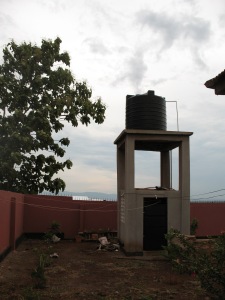I spent a lot of time in our project area last week. This means that I was spending a lot of
time talking to our local partners (officers in the local government) determining how to move forward with the project. On about day three, I realized that I was frequently wearing a Patronizing Smile when I talked to them. Yes, the dreaded Patronizing Smile (I’m just going to assume this is a thing and that it is to be dreaded.)
Patronizing our local partners sounds bad, right? Well, let’s take a closer look at the anatomy of the Patronizing Smile with today’s lesson:
Communicating with Local Partners 101:
Step 1 – Convey a positive, can-do attitude. This is why we’re smiling in the first place. It’s not so much because we love speaking in really slow English or really bad Swahili or that we just adore wondering how many weeks it will actually take to accomplish the small task we’re discussing. It’s that we want to convey confidence. We can do this! You can do this! Please help me do this!
Step 2 – Here’s where your average fake encouraging smile starts to become patronizing. This is a complex step, so feel free to read slowly to really take it in. After you’ve slowly said, ‘So now we just need to do xxx to complete this extremely important step in the project’ you pause, still smiling, to assess comprehension.
But oh no! Unfortunately, while you remain frozen in your fake and now increasingly patronizing smile, the local partners just look at you blankly. You’re going to have to make a big decision now. Make the right decision, and you’ve successfully navigated the linguistic and cultural communication difficulties associated with your bad-ass field job. Make the wrong decision, and the patronization will increase.
Did they:
a.) Not understand your English?
b.) Understand your words but not the content of what you said?
c.) Understand perfectly but not feel the need to convey that through any words or facial expression or body language?
d.) Understand but not want to do what you just said needs to be done (even though they are the ones who said that’s how it should be done).
At this point, you need to quickly decide which one of these is likeliest and act (all the while maintaining your positive, can-do smile.) Should you:
a.) Repeat in bad Swahili, risking revealing that you think they didn’t understand even though maybe they did?
b.) Assume they understood and just move on, risking the possibility that they didn’t understand and you’ll have to start all over?
c.) Or, worst of all, and as a last resort, increase the patronizing exponentially and ask, ‘Do you understand?’ Yikes! Obviously, this cuts to the chase, but good god, do you really want to ask people thirty years older than you if they understood a simple point like this?!
Step 3 – Live with the Consequences of Your Decision. Frankly, at this point, you’re probably just happy that the action you were discussing has a 90% chance of being done. Did they ultimately understand? You think so. Will they do it? Boy, you hope so. Will you have to ask more patronizing questions to find out? Definitely.
Post script: as you can probably tell, this was written on a stressful day. I can now report that, as usual, my local colleagues have come through completely-ish
and all is well.








